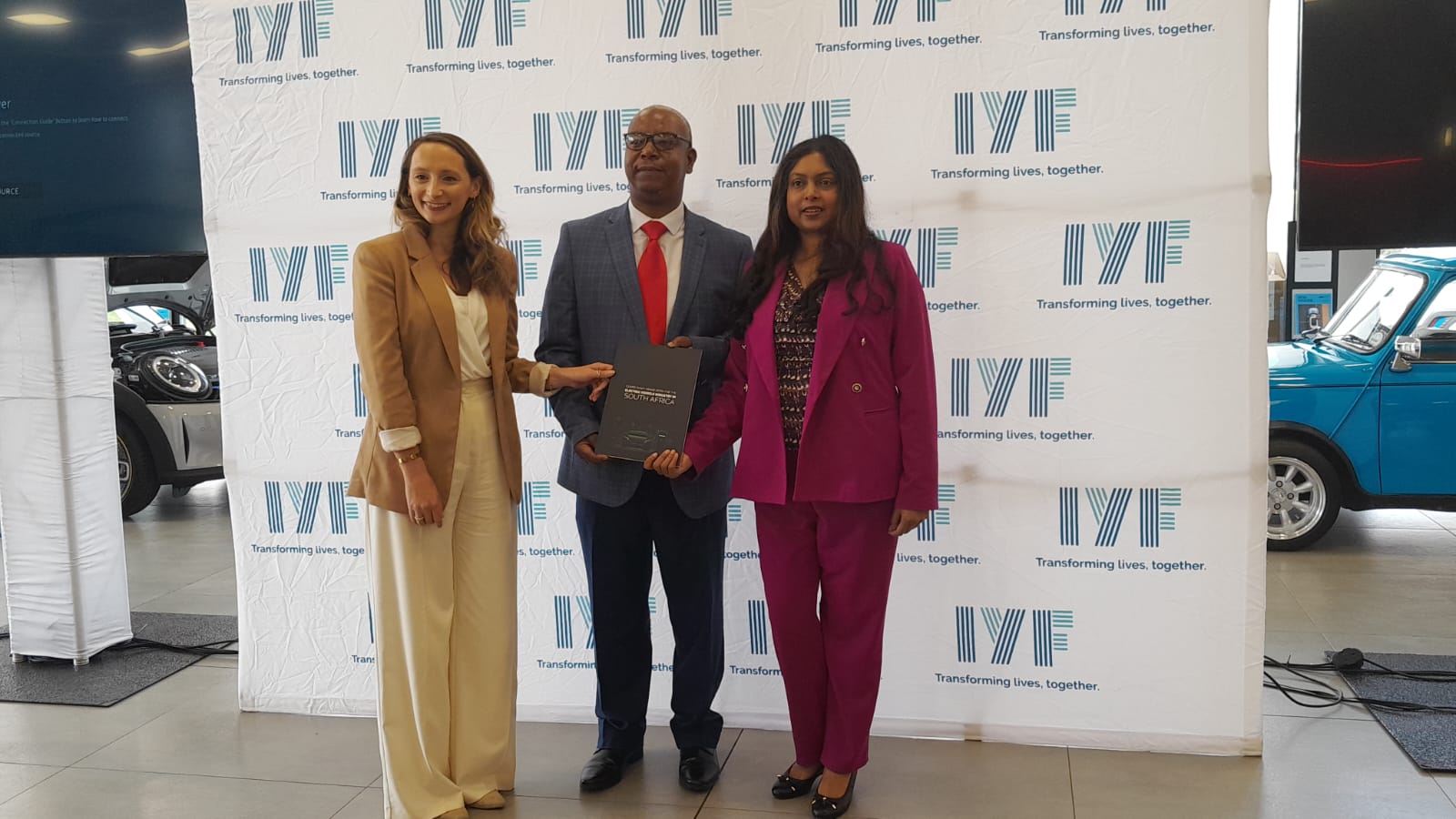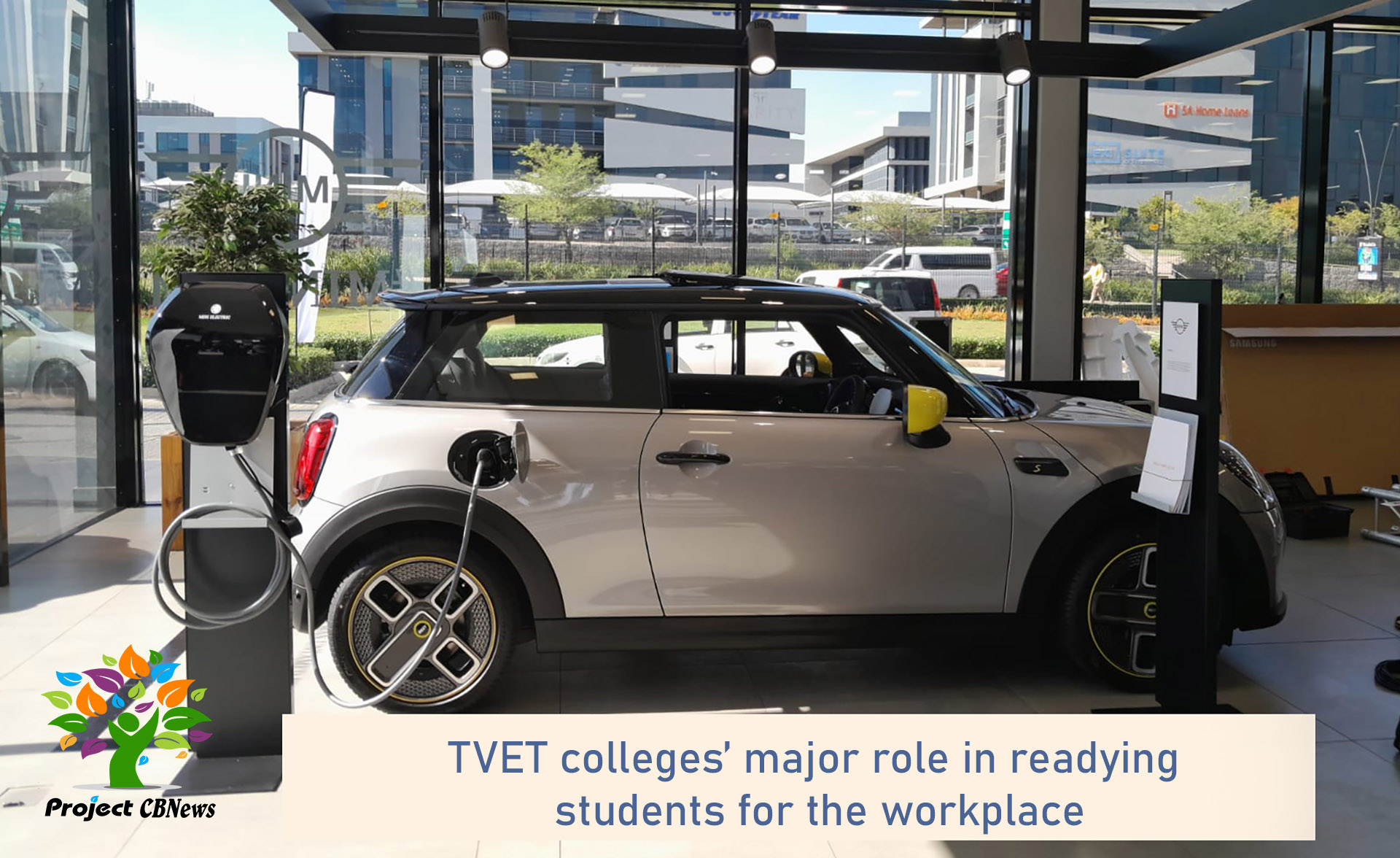The International Youth Foundation (IYF) in partnership with the National Association of Automotive Component and Allied Manufacturers (NAAMCAM), as well as the Department of Higher Education and Training (DHET) first launched the High Gear programme in 2019. The programme is expected to run through June 2024. High Gear, being one of the three programmes that are managed by IYF South Africa, has been advancing the country’s public Technical and Vocational Education and Training (TVET) college systems.
The research presentation and handover event took place at MINI Midrand, with Mr. Chilu Lemba being the MC. Lemba is best known for being a radio and television presenter, voice-over artist, author, and musician. The main message of the event was that South African students lack the skills related to producing and maintaining EVs and the Department of Higher Education needs to make drastic changes if they wish to close that gap, especially with EVs being vehicles of the future.

The Mini EV
Rebecca Tron, the Head of Economic Growth of the British High Commission in Pretoria, states that the research will help to unlock capital growth opportunities between the two countries. Ms Anusha Naicker, the Country Director of IYF SA, gave an overview of the purpose of the EV study. She stated that EV adoption is particularly driven by the need and importance to decarbonise globally.
“Globally, the momentum for electric mobility has increased exceptionally. This global shift has primarily been driven by national emission reduction commitments stemming from the Paris agreement on climate change, growing air pollution concerns and continued crude oil price volatility,” states Naicker.
She further comments that many countries are shifting their policies towards accelerating electric vehicles. The automotive sector has been labelled as the key player in the country’s economic landscape. Therefore, a thriving EV market in South Africa that is supported by local manufacturing brings hope of sustainable economic development and job creation, as well as an advance in the development of the local green economy. Furthermore, Naicker states that specialised engineering skills will assist in propelling the country to global competitiveness in the EV space.
“South Africa has many of the materials and structures in place to build EVs, but this will require new and different skills in the industry as well as mandating these skills be taught at key Institutions of higher learning,” says Naicker.
The study was taken with a focus on the need for EV skilled workers required to promote the steady growth of South Africa’s market for fully electric, battery-powered hybrid and plug-in hybrid vehicles.
A representative from the TVET Programmes and Qualifications Directorate from the Department of Higher Education and Training spoke on DHET’s Approach to Skilling for the Transition of EV. He stated that the success of the low-emission development strategy will be influenced by the introduction and expansion of electric vehicles in the country.
“In order for that to happen, today’s youth need to be equipped with the necessary resources to sustain the industry growth. In collaboration with the IYF, we are working together to efficiently integrate industry-standard practicals in the TVET curriculum. Given that we require qualified EV engineers in the next 5-10 years, we have a limited window of opportunities to ensure that EV courses and practical training are available,” the Department of Higher Education and Training representative states.
Therefore, it is important that course materials are curated, and lecturers are adequately trained. The influx of EVs into the country will bring a rise to a new green supply chain, which is currently not in existence. Furthermore, these logistics will be decided upon collaboratively, with input from transport networks, stakeholders, government, industry as well as the public and private sectors. Moreover, this chain will be the system that electric vehicle engineers will need to fall into.
Many of IYF’s programmes integrated into TVETs are already prioritising the skills necessary tools for personal and professional life. The research will assist the DHET with a starting point of equipping their lecturers and tackling weak points and better understanding the current state of automotive engineering curricula in TVETs, which is the main point of the research.
As EVs are being sought out, the issue of maintenance comes to the surface as well as the competency of the engineers. Fortunately, the research provides a platform for the stakeholders involved to ensure customers that purchasing an EV is feasible. Moreover, the handover of the research will encourage EV purchase in the country.
“The research as led by the IYF is crucial, and we thank the British High Commission Pretoria, IYF and all the collaborators for their input in commissioning the research. This will provide the Department of Higher Education and Training with a starting point. Our approach will be proactive, methodical, and measured,” he says.
The Head of Economic Growth, Southern Africa, Rebecca Tron, states that although there is a high unemployment rate in the country, the youth are hustlers and know how to work.
“The South African is dedicated and passionate. The more we can provide opportunities for them, and create jobs for them, the more we can unlock the potential of that capital and see the economy grow. That is why we started our skills programme,” Tron comments.
The commission works across many levels; national levels, working with the government and the Presidential Youth Employment Intervention at DHET. They also work at the community level with TVET colleges along with other institutions and employment initiatives. She further states that they have continued the work for the past few years and for growth, there needs to be inclusivity as well as sustainable skills development. Tron further explains that TVETs are capable of supporting a green revolution in the country. The United Kingdom has been supporting in many ways, such as through the Just Energy Transition Partnership

The Programme Director of High Gear, Mr. Khali Patel, gave an overview of High Gear and the approach to the EV study. He stated that the competency framework in the report was built on the competency-based education philosophy where education systems are driven by changing competencies in the industry. The framework highlights electric vehicle system engineering, design and manufacturing process, renewable energy and battery structure operation, quality and standardization, electric vehicle maintenance, and charging infrastructure. Cognitive as well as personal effectiveness competencies and finally, workplace behaviour and logistics competencies.
“Through a combination of qualitative and quantitative research methods, the report highlighted competency deficiencies in the EV industry in South Africa as it faces significant infrastructure and electricity challenges,” Patel states.
Through the research report, High Gear aims to provide constructive solutions and recommendations. The Competency Framework provides opportunities within TVET college systems and curriculum to build more on transport-related knowledge and skills so that students are equipped for the workplace.
A representative from Ngwawethu Consultant, Love David, on behalf of Prof. Nwulu gave an overview of the EV Research Report. The EV Competency Framework was based on competency-based education, and the competency is driven by what the workforce needs. They reviewed the TVET and Human Capital Development, stating that TVETs are designed to improve human capital by developing practical skills, attitudes and behaviors that make students inventive, resourceful as well as creative.
The EV competency framework was achieved through the identification of specific skills and competencies required in the electric vehicle industry, the identification of skill gap and competency mismatch for EV production and the development of a competency priority framework for TVET in relation to the electric vehicle industry. Furthermore, the South African EV policy Documents include the South African Automotive Master Plan, 2021-2025. The Green Transport Strategy for South Africa (2018-2050) and the Auto Green paper on the Advancement of New Energy Vehicles in South Africa. The industry stakeholders raised 43 competencies as well as skill sets that are needed for producing EVs in South Africa.
The report programme closed off with Kyle Dreyer, the manager at Mini Midrand, sharing his thoughts on the inevitable growth of the EV sector in the country. Mini in Midrand, as a brand, has made incredible efforts in promoting electric vehicles in its market. In July 2020, Mini South Africa launched an All-Electric Mini Cooper SE. This raised a demand for electric mini cooper, slowly introducing it to the country.
“Mini South Africa recognizes the importance of sustainability and the need to reduce the carbon footprint,” Dreyer states.
DHET Handover




